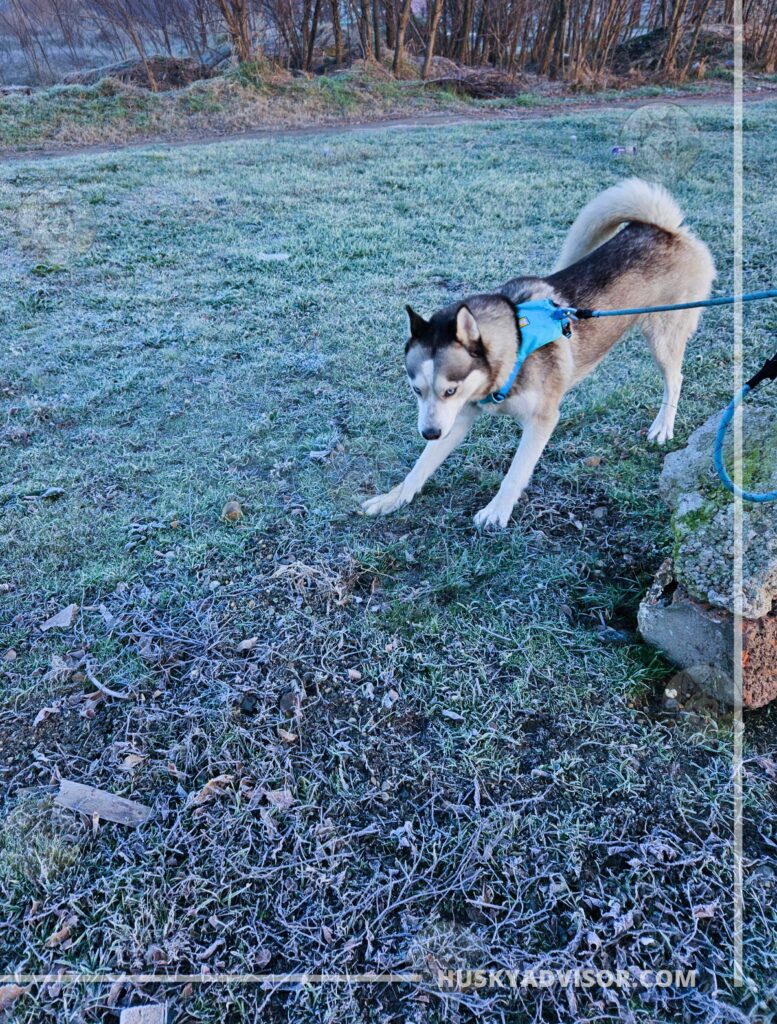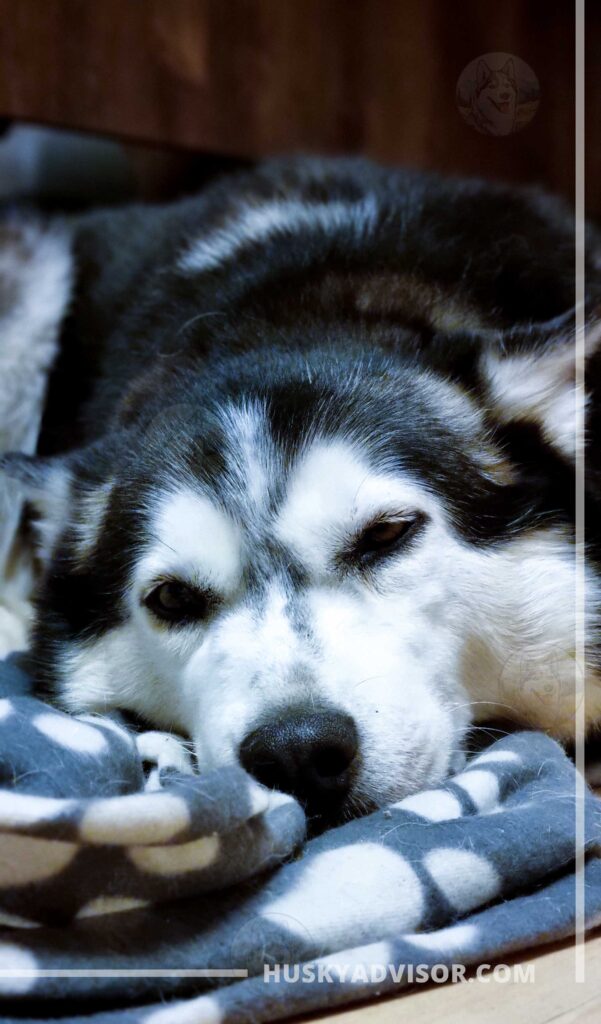Siberian Huskies are well-known for their majestic looks, boundless energy, and striking blue eyes. As a breed designed to thrive in colder climates, they are particularly well-suited for winter conditions. However, with the change in temperature, their nutritional needs might change too. One common question Husky owners have is: do Huskies need to eat more in winter?
In this article, we’ll explore how colder weather affects your Husky’s diet, energy requirements, and the adjustments you might need to make to ensure they stay healthy and active. By understanding these unique needs, you can keep your Husky in peak condition throughout the winter months.

Understanding the Siberian Husky’s origin and natural adaptability
To understand whether your Husky needs to eat more during winter, it’s important to consider their origin. Siberian Huskies were bred by the Chukchi people in northeastern Siberia to pull sleds across long distances in frigid conditions. This history has equipped them with a dense double coat, a high level of endurance, and an efficient metabolism.
Huskies have a natural adaptability to cold weather, which means they are less affected by drops in temperature compared to other breeds. Their thick coat, made up of a soft undercoat and a protective outer coat, insulates them and helps retain body heat. This efficient heat retention plays a role in their energy consumption and dietary needs during the colder months.
Efficient metabolism of Siberian Huskies
Huskies are known for their efficient metabolism, which means they can perform strenuous activities on a relatively low-calorie intake compared to other active breeds. Unlike other large dogs, they won’t consume excessive amounts of food even when working hard in harsh conditions. However, this can change depending on their activity level, exposure to the cold, and whether they’re spending more time outdoors.
How temperature and activity levels affect a Husky’s caloric requirements
Do huskies need more calories in winter?
In general, colder weather increases the calorie requirements of dogs. As temperatures drop, your Husky’s body will burn more energy to maintain its core temperature. This increase in energy expenditure is especially significant if your Husky spends a lot of time outdoors or engages in high levels of physical activity such as running, pulling, or playing in the snow.
However, not all Huskies need to eat more in winter. The necessity for increased food intake depends on several factors:
- Activity level
- If your Husky is more active in winter, such as engaging in winter sports or sledding, you’ll need to increase their food portions to meet their higher caloric needs.
- Outdoor time
- Huskies that spend long hours outside in the cold will naturally burn more energy than those who stay primarily indoors.
- Resting vs. active state
- A sedentary Husky will not require as many calories, even in colder weather, as a highly active one.

Signs that your husky needs more food in winter
If you’re unsure whether to increase your Husky’s food intake during winter, look out for these signs:
- Weight loss
- A clear indication that your dog is not getting enough calories is weight loss. Regularly monitor your Husky’s body condition and adjust their food portions if you notice them losing weight.
- Increased hunger
- If your Husky seems hungrier after meals or is begging for food more often, it could be a sign that they need more calories.
- Reduced energy levels
- If your usually energetic Husky seems lethargic or less enthusiastic about physical activities, they might not be receiving enough energy from their diet.
Determining the proper diet for your Husky in winter
If you determine that your Husky needs more food in winter, it’s important to ensure that the additional calories come from quality sources. Overfeeding or giving low-quality food can lead to weight gain and other health problems.
Adjusting your husky’s diet for winter
- Increase protein and fat content
- If your Husky is very active or spends a lot of time outside, consider adding more protein and healthy fats to their diet. These macronutrients provide more sustained energy and help maintain lean muscle mass. High-quality protein sources like chicken, beef, or lamb, and healthy fats such as fish oil, are excellent additions.
- Choose a high-energy formula
- Many dog food brands offer high-energy or performance formulas specifically designed for active dogs or those exposed to cold weather. Look for options with increased calorie density to meet your Husky’s needs.
- Include warm, moist food options
- During winter, many Huskies appreciate a warm meal. Consider mixing a bit of warm broth with their kibble or adding moist, high-quality canned food. This not only makes the meal more palatable but also helps keep your Husky hydrated. You can cook for your husky some protein and vegetables, it will be highly appreciated. Make sure is not too hot before feeding it to your husky.
Feeding Schedule: Does it Need to Change?
While the amount of food might change, maintaining a consistent feeding schedule is crucial for Huskies. Feeding your dog twice a day-morning and evening-should suffice. However, if you find your Husky is experiencing hunger in between meals, consider offering a small afternoon snack to keep their energy levels stable.
Common mistakes to avoid when feeding Huskies in winter
Feeding Huskies more in winter isn’t just about piling on extra food. There are a few common pitfalls to watch out for:
- Overfeeding
- While some Huskies need more calories, it’s easy to overestimate how much to add. Regularly check your dog’s weight and body condition to avoid unintended weight gain.
- Low-quality food
- Just increasing food quantity without paying attention to quality can lead to poor nutrition. Always choose high-quality food options with balanced nutrients.
- Ignoring hydration
- Dogs are less likely to drink water in winter, which can lead to dehydration. Ensure your Husky has access to fresh water at all times, and consider adding moisture to their food to promote hydration.
- Lack of monitoring
- Don’t rely solely on the season to determine food portions. Monitor your Husky’s activity levels, appetite, and weight regularly, and adjust as needed.

Do indoor Huskies need to eat more?
For Siberian Huskies that spend the majority of their time indoors, their winter dietary needs might not change significantly. If your Husky isn’t exposed to cold temperatures for extended periods and maintains a relatively low activity level, their caloric needs may remain the same.
However, if you increase your Husky’s exercise routine in winter (e.g., more outdoor play sessions or longer walks), you should still consider upping their food intake slightly.
Other considerations: Senior Huskies and puppies
Senior huskies’ dietary needs during winter
Older Huskies may have different dietary needs. As they age, their metabolism slows down, and they might not need as many calories as younger, more active dogs. Focus on maintaining a balanced diet with joint support supplements, especially if they are less active during winter.
Husky puppies’ dietary needs during winter
Puppies, regardless of the season, require a high-calorie diet to support growth and development. During winter, ensure they’re receiving enough calories to sustain their energy levels, especially if they’re being trained or are particularly active.
Conclusion: Do Huskies need to eat more in winter?
In summary, the answer to whether Huskies need to eat more in winter isn’t a simple yes or no. It depends on factors like their activity level, exposure to cold, and individual metabolism. While many Huskies will benefit from a slight increase in food intake during colder months, the key is to monitor their weight, energy, and overall condition closely.
For active, outdoor-loving Huskies, a higher-calorie, protein-rich diet can help maintain optimal health and energy levels. For more sedentary, indoor Huskies, maintaining their usual diet may be perfectly fine. The best approach is to adjust their diet based on their unique needs, ensuring your furry friend stays happy, healthy, and thriving throughout the winter season.
By understanding these nuances, you can ensure that your Husky remains the happy, energetic, and beautiful companion that you know and love, no matter how chilly it gets outside!


